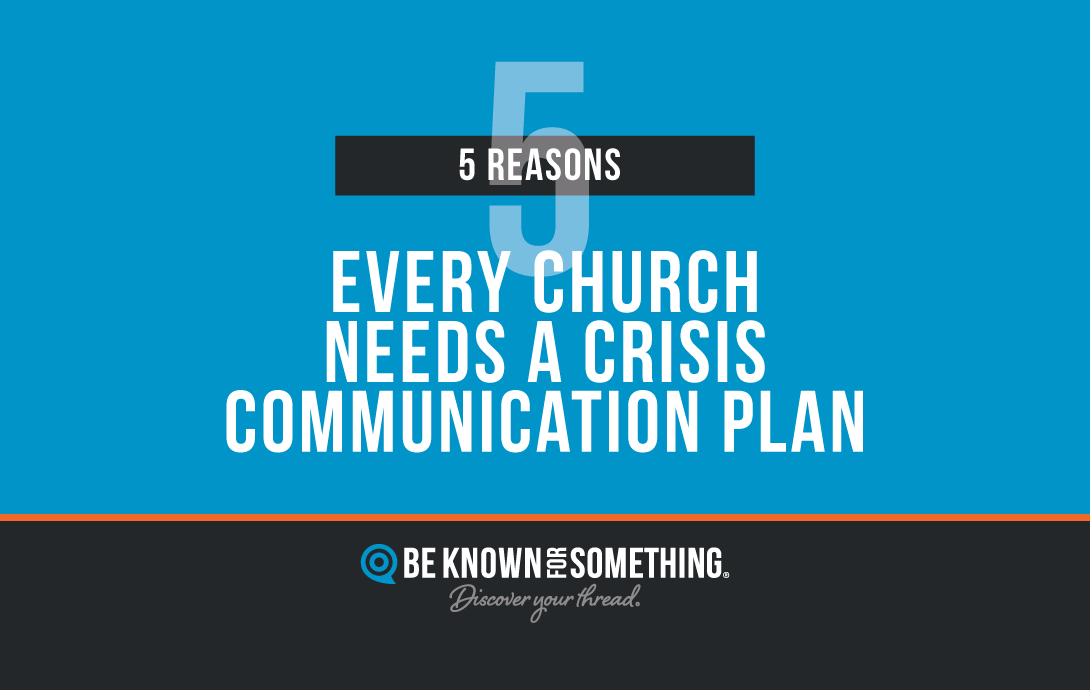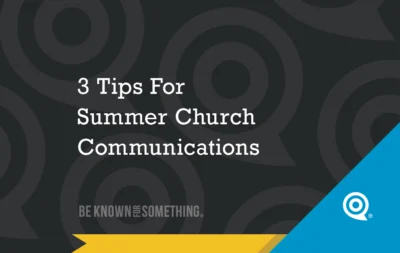
Church SEO: Branding Terms Defined
Everyone likes to be found: that’s why Church SEO is important. Especially being found on Google (or Yahoo, Bing, etc.)

Every church needs a crisis communication plan to get leadership on the same page before a negative story is even written. What is the best-case scenario for a church that takes the time to craft a crisis communication plan? It’s never used.
However, it doesn’t take a lot of research, Google searching, or listening to the evening news to realize why a church needs to proactively plan for a crisis. Every church should know the steps for communication when the heat is turned up and they are being bombarded by many inquires.
Here are 5 reasons it’s wise to craft a crisis communication plan (with a practical tip for for each point).
1) Bad things happen to good people
In times of crisis, whether it’s a natural disaster, a scandal, or unexpected challenges, even the most well-meaning church can find itself thrust into the spotlight of adversity. A crisis communication plan equips a church to respond with strength and compassion, demonstrating its commitment to supporting its community during difficult times.
Practical tip: Designate a crisis communication team comprising key leaders and communicators within the church. Establish clear protocols for information gathering, verification, and dissemination. Regularly update contact lists for internal and external stakeholders to ensure swift communication in times of crisis. Be sure to understand who will take the lead when a crisis occurs
2) No church is immune to crisis
Just as individuals face trials and tribulations, so too do houses of worship. Jesus warned and comforted in John 16:33: “I have told you these things so that in me you may have peace. You will have suffering in this world. Be courageous! I have conquered the world” (CSB). Acknowledging the inevitability of crisis allows a church to proactively prepare, ensuring they can weather the storm with resilience and integrity. An effective crisis communication plan draws its strength on Christ and His enduring peace.
Practical tip: Develop pre-approved messaging templates for common types of crises (e.g., natural disasters, allegations of misconduct, etc.). Train a designated spokesperson on how to deliver messages authentically and empathetically. Monitor social media and news outlets for any mentions of your church and know how to respond appropriately and promptly to correct potential misinformation.
3) The best time to prepare a response is before it’s needed
By establishing a crisis communication plan ahead of time, churches demonstrate prudence and foresight. Being proactive enables swift and effective responses when crises arise, minimizing confusion and maximizing the potential to positively influence outcomes.
Practical tip: Create a centralized communication hub, such as a dedicated webpage (that is public) or mobile app section (which is more internal), where members can access real-time updates and emergency resources. Before any crisis, encourage members, if possible, to opt-in to receive emergency alerts via email or text message. Regularly familiarize church staff and volunteers with emergency protocols. (Don’t overdo communication about your plan to your entire membership if there’s no current crisis.)
4) An approved plan has more speed to enact
Having an approved crisis communication plan in place empowers church leaders and communicators to act decisively and swiftly when faced with unexpected challenges. This agility can be crucial in managing the situation effectively and mitigating potential harm.
Practical tip: Develop key church talking points and FAQs to ensure consistent messaging across all communication channels. Always remember Who you represent and the potential impact on His kingdom, yet be authentic and truthful. There’s a time and place for positivity and optimism, but be careful about too much spin that can appear to be deflecting.
5) Fewer errors occur when planning occurs during calm
Planning for crisis communication during times of calm allows for careful consideration, thoughtful strategy development, and meticulous preparation. When crisis strikes, having already established protocols and procedures reduces the likelihood of making hasty or ill-informed decisions, leading to greater confidence and effectiveness in response efforts.
Practical tip: Ensure your crisis communication plan includes pastoral care components, such as setting up a helpline, a specially monitored email account, or support groups for affected individuals. Communicate regularly with the congregation, acknowledging their concerns and offering words of encouragement and prayer. Leverage your social media channels to reinforce biblical messages of hope amidst adversity (being careful about authenticity and refraining from too many unimportant details in any public arena).


Everyone likes to be found: that’s why Church SEO is important. Especially being found on Google (or Yahoo, Bing, etc.)

When I’ve taught Sunday School classes, I’m always amazed how attendance fluctuated very little each week yet we had different

Church Rebranding, it’s all the rage. And it’s a great trend. In fact, if you haven’t branded or rebranded in
Discover your thread®. Be Known for Something® relevant and needed. Pastor, control your church brand and be heard again.
– Discover Your Audience
– Build Your Brand
– Communicate & Be Heard
Communicate so your congregation & community pays attention to your website, social media, & email!
We'll never spam you. Unsubscribe anytime.
